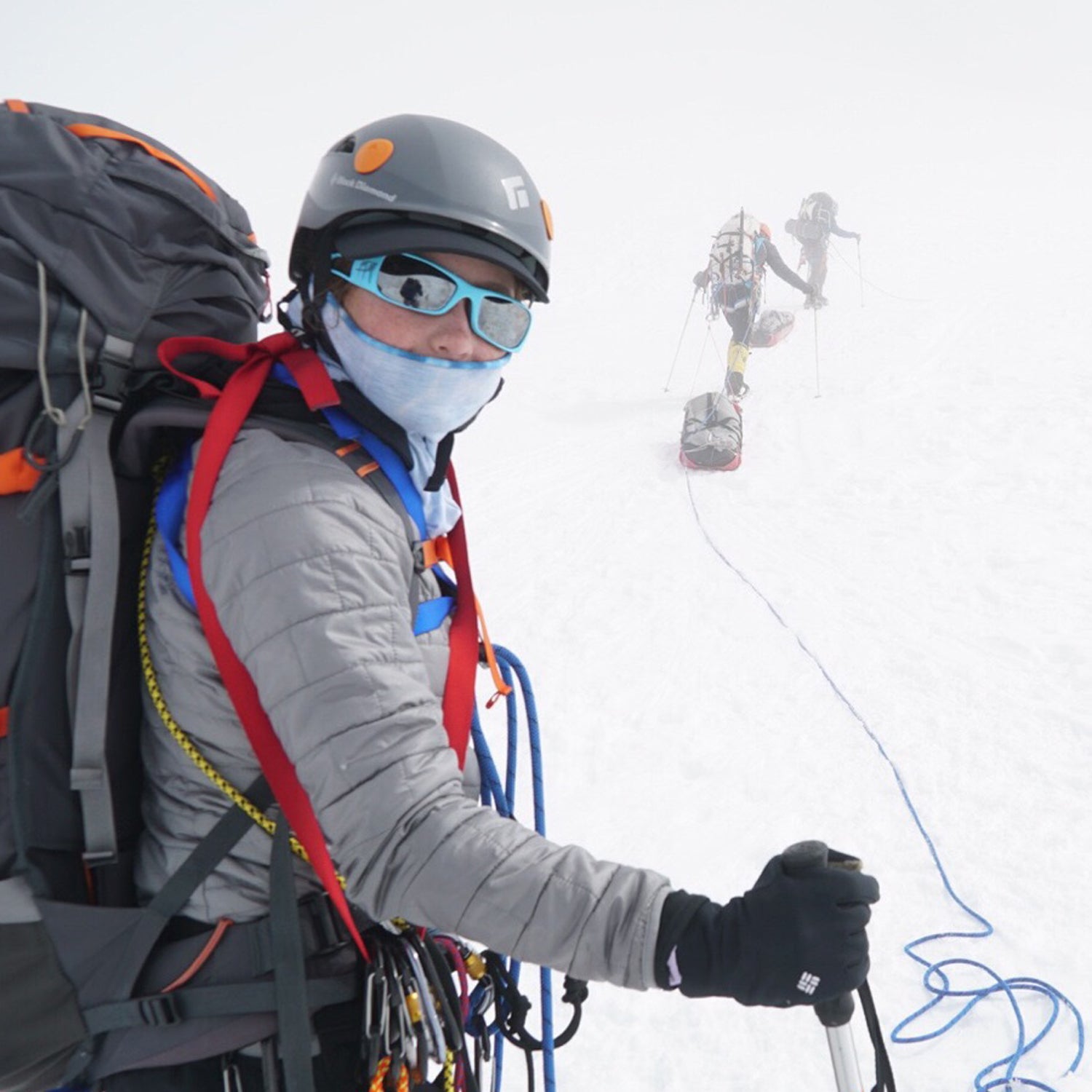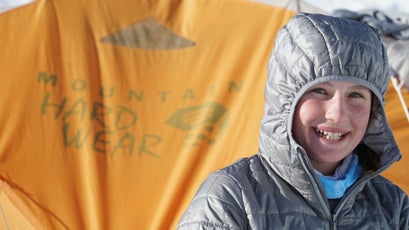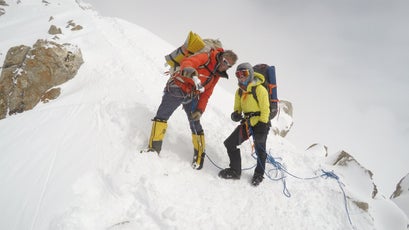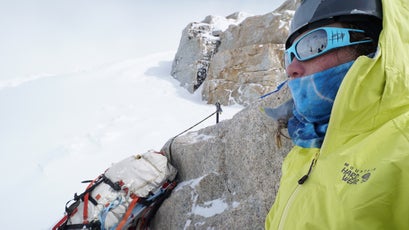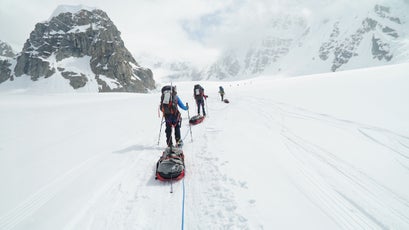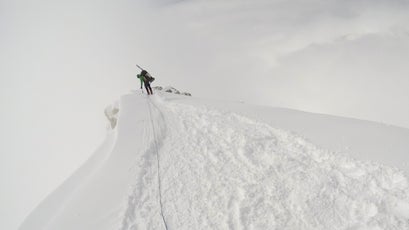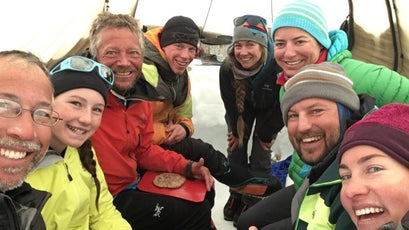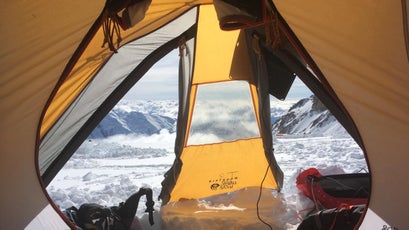In her bestselling book, , University of Pennsylvania psychologist defines grit as passion and perseverance for long-term goals. According to her research, itŌĆÖs one of the biggest predictors of future achievementŌĆönot innate talent or brains or even past successes, but the ability to tolerate uncertainty, push through adversity, and hold onto big dreams for the long haul. Grit is a major determinant of success in academics and life, but it isnŌĆÖt taught in school. So how can kids develop it?
For 13-year-old Lucy Westlake, the answer is easy: climbing mountains. Since 2011, Westlake has been trying to become the the highest peak in all 50 states. To date, sheŌĆÖs climbed 49 high points, and she holds the record as the youngest girl to climb the highest points in the lower 48. (SheŌĆÖs the youngest by five years, too.) In June, Westlake attempted Denali, her final peak, with her father, Rodney, and three guides from . The team spent 20 days on the mountain, carrying 60-pound loads up the headwall on fixed ropes above a gaping crevasse to high camp, at 17,200 feet, before foul weather forced them to call off their summit bid.
But Westlake refused to see it as defeat. Her climb raised $20,000 for the , a nonprofit dedicated to getting more kids outside by creating free gear libraries. Days after she got down, Westlake : ŌĆ£I always thought that I would make it to the top on my first try. IŌĆÖm not sure why I thought that other than that was my experience with all the other mountains I have climbed. But this one was different. Denali is a world of its own made up of rock and ice and snow,ŌĆØ she said. ŌĆ£ItŌĆÖs so big and so majestic that one cannot even begin to imagine its beauty and magnitude until you live on it for a while. This is a mountain that turns you into a mountaineer. I now understand that a mountaineer is one that can accept descending without reaching the summit, and then long to go back.ŌĆØ
ŌĆ£The thing that builds determination the most and makes you a better athlete and person isnŌĆÖt completing your goal. ItŌĆÖs losing and seeing what you could do better. Winning and summiting are great, but what really makes you resilient is defeat, not climbing the mountain.ŌĆØ
I called Westlake at her home in Naperville, Illinois, on her way to a triathlon practice (she is training twice a day for , on August 5) to find out how she got her grit and what it takes to redefine failure as success.
OUTSIDE: Tell me what happened on Denali.
LUCY WESTLAKE: WeŌĆÖd made it up to high camp and were resting up to try for the summit if the weather was good. In the middle of the night, our guides woke us up, saying, ŌĆ£ThereŌĆÖs been an accident, and weŌĆÖre going to help.ŌĆØ Three Nepalese climbers had made a summit attempt the day before and were coming back down. They were two hours from camp, and temperatures were dropping, and the client had the beginning symptoms of pulmonary edema. WeŌĆÖd heard him coughing in the night. They didnŌĆÖt make it all the way down.
The climber died?
Yeah, the guides made it down, but the climber didnŌĆÖt make it. The rescue took, like, five hours, and our guides were really wiped out. But also the weather wasŌĆÖt good. We couldnŌĆÖt have ascended anyway.
HowŌĆÖd you feel when you found out your climb was over?
I was really disappointed that we had gone up all that way. WeŌĆÖd worked so hard to get to that point. When you get to these big mountains, a lot is just luckŌĆöwhether the weather will cooperate. I mean, you have to have the skill to climb it, but also the mountain has to let you climb it. I was still really glad I went. I really feel like a mountaineer now instead of a climber.
Do you feel like you were prepared?
Physically, yes, but I definitely wasnŌĆÖt mentally prepared to turn around, because I never had to turn around on another mountain. I didnŌĆÖt know it was such a huge mountain. IŌĆÖd heard it was kind of like Rainier, just longer and colder, but itŌĆÖs totally different. It was unlike anything IŌĆÖve ever experienced.
YouŌĆÖre five years younger than the current record holder. ThatŌĆÖs a lot of time. Are you going to keep trying for the record?
Yeah, I hope IŌĆÖll be able to go back to Denali. Maybe not next year, because IŌĆÖll be the oldest in my triathlon age group, and I want to focus on that. But hopefully in 2019.
Do you ever worry that someone else is going to snap it up?
ItŌĆÖs a possibility. ThatŌĆÖd be kind of cool. I hope that other people try, because itŌĆÖs not a great record if no oneŌĆÖs trying to break it. I really hope that other kids will want to, because I know that they can. You have to want to. There are not a lot of [mountaineer] role models for kids to see.
Most guides on Denali donŌĆÖt take kids younger than 16. Did you ever feel like you were too young?
It was really hard to find a team that would take me up, but I liked being young. It pushed me more, because I wanted to be an equal part of the team. It just made me want to work harder.
When did you decide to go for record?
When we started these, we didnŌĆÖt plan to break any records. My family loves hiking, and I love it. We were on a mission trip in Kentucky, and is a few miles away, so we just drove up that one.
You drove up your first one?
Yeah, not very exciting. We started researching a bunch of high points and realized this was a thing: to hike the high points. WeŌĆÖd go on road trips to visit family around the country, and weŌĆÖd just break up the trips by hiking a few high points here and there. Eventually they added up, and weŌĆÖd done 30. I thought I could break the record when I finished Rainier in 2015, when I was 11. We still had ten left, and thatŌĆÖs when I started going for it.
Do you always climb with your dad?
Yeah, weŌĆÖve also got the record for the youngest father-daughter duo to climb the lower 48.
Is he a good climbing partner?
Yeah, but sometimes itŌĆÖs annoying staying in the same tent with him for 20 days.
Do you train outside?
Most of my training is triathlon, but before Denali, me and my dad would get on an elliptical machine with a 50-pound backpack. There arenŌĆÖt really hills in Illinois, so other days we would just incline the treadmill all the way.
WhereŌĆÖd you get your grit?
I feel like IŌĆÖve had it since a young age. IŌĆÖm really competitive, and I love setting goals for myself. Sports are a great way to have grit. There are going to be hard practices and bad days, but you just have to push through. They teach you not to give up.
Did you ever feel like giving up on Denali?
Yeah, when we were carrying from Camp 3 up to the ridge. That was definitely a bad day.
What did you do to keep going?
IŌĆÖve always tried to not give up. I feel like if I give up once, IŌĆÖll keep giving up in other things. So I didnŌĆÖt think ahead, tried to keep it simple, and just put one foot in front of the other.
But in the end, you did have to give up.
The thing that builds determination the most and makes you a better athlete and person isnŌĆÖt completing your goal. ItŌĆÖs losing and seeing what you could do better. Winning and summiting are great, but what really makes you resilient is defeat, not climbing the mountain. It just makes you want it that much more.
Do you have any advice for other kids?
Start when youŌĆÖre young. No matter what it isŌĆöschoolwork or a math problem or a raceŌĆöif you practice not giving up when youŌĆÖre younger, youŌĆÖll keep getting better at it.


